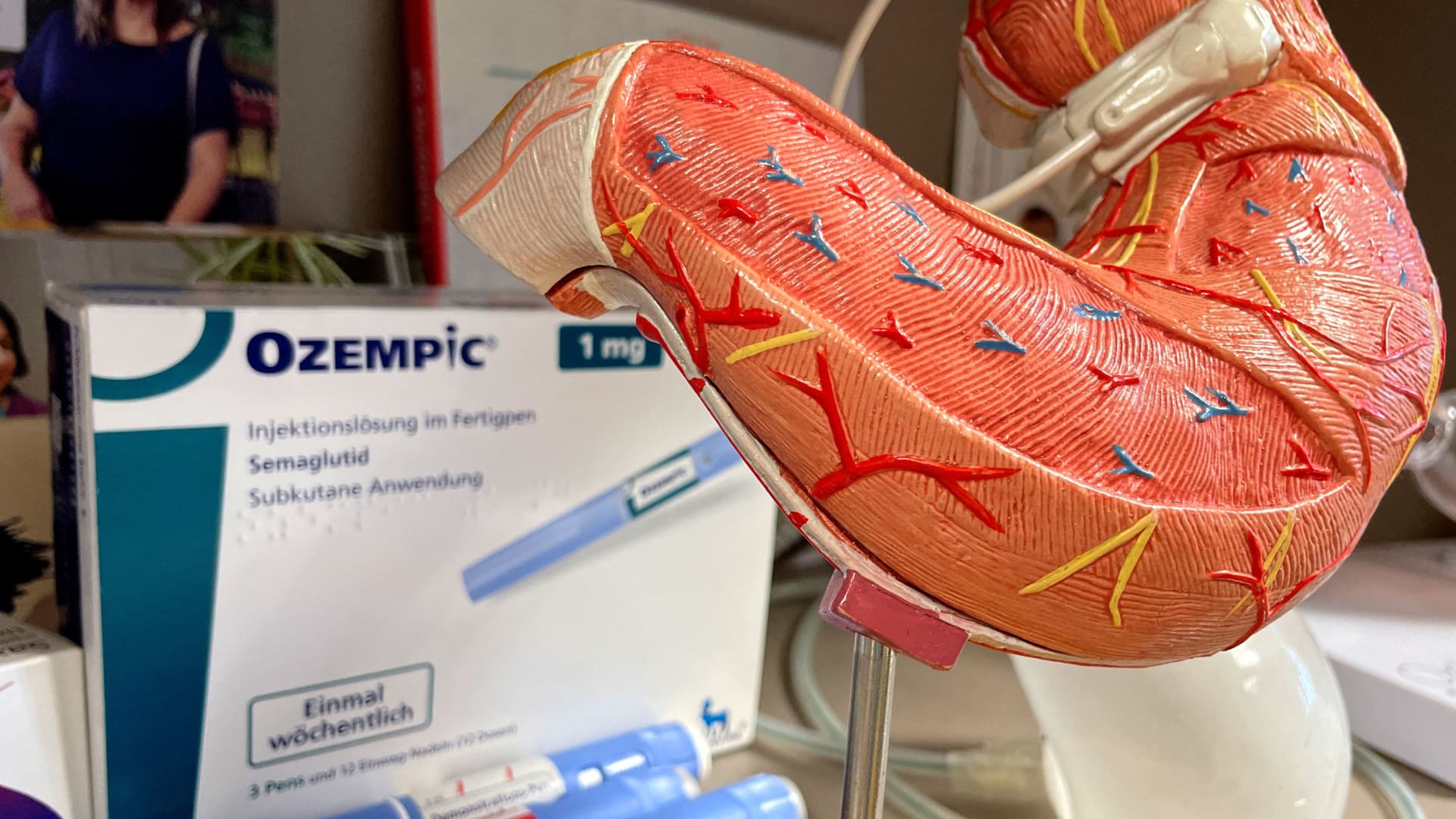Novo Nordisk plans to launch its weight-loss drug Wegovy in more countries, despite shortages caused by high demand, according to CEO Lars Fruergaard Jorgensen.
The Danish pharmaceutical company Novo Nordisk, known for its weight loss drugs Ozempic and Wegovy, is driving most of Denmark's recent economic growth and has become the second most valuable public company in Europe.
The rise of diabetes and weight loss drugs like Ozempic is not only impacting pharmaceutical companies, but also retailers, makers of weight loss products, and other industries, with knock-on effects ranging from increased foot traffic in stores and changing consumer behavior to potential disruptions in the diet industry.
Novo Nordisk has launched its weight-loss injection, Wegovy, in the UK, following a controlled and limited launch, with a monthly supply priced between £199 and £299 for private patients through an online pharmacy chain.
Eli Lilly could potentially generate $50 billion in annual sales from weight-loss drugs by 2030, positioning the pharmaceutical company as a major beneficiary in the obesity treatment market, according to J.P. Morgan.
Ypsomed has announced a long-term supply deal with Novo Nordisk for autoinjectors, indicating the success of Novo Nordisk's weight-loss drug business and the potential for growth in the obesity market.
Anti-obesity drugs developed by Novo Nordisk and Eli Lilly have the potential to transform public health but could also disrupt industries such as food, fitness, and healthcare, affecting companies like Nestlé and McDonald's.
The introduction of weight-loss drugs like Wegovy could lead to a healthcare crisis, as the cost and demand for these medications may overwhelm insurers, employers, and government programs that purchase medications in the United States.
The global market for weight-loss drugs is projected to reach $100 billion by 2035, with revenue in the US potentially reaching as high as $70 billion alone.
The rise of GLP-1 weight loss drugs like Ozempic and Wegovy has the potential to impact various industries, with drug manufacturers such as Novo Nordisk and Eli Lilly expected to benefit, while medical device companies, fast-food chains, and beer and tobacco companies could be at risk.
The demand for diabetes and obesity drugs, such as Ozempic and Wegovy, has increased by 300% in the last two years, with Ozempic accounting for 65% of total prescriptions due to its off-label use for weight loss, but future prescription volumes will depend on supply shortages and other factors.
The US FDA has updated the label of the diabetes drug Ozempic to include reports of blocked intestines in some users, while its sister drug Wegovy acknowledges a condition known as ileus; concerns have also been raised over the development of gastroparesis in some users, leading to a lawsuit against drugmakers Novo Nordisk and Eli Lilly.
Shares of Structure Therapeutics surged more than 30% as their experimental obesity pill demonstrated success in helping participants lose an average of 10 pounds in a small early-stage trial, positioning it to potentially compete in the booming obesity drug market.
Novo Holdings, the controlling shareholder of Novo Nordisk, could receive a significant windfall from the success of weight-loss drug Wegovy, potentially making it a major philanthropist and ESG investor.
The popularity and usage of weight-loss drugs like Ozempic are causing a decrease in sales for snack makers as customers on these medications are cutting back on high-fat and salty treats due to appetite suppression.
The high demand for weight loss drugs like Wegovy and Mounjaro has exceeded the capacity of drugmakers to manufacture them, creating shortages and potential supply strain for treating obesity.
Anti-diabetic drugs like Ozempic and Wegovy, known for their weight loss effects, are causing shoppers to reduce their grocery purchases, leading to stock drops for beer and snack distributors such as Nestle, Mondelez International, and Kraft Heinz.
The demand for self-injection weight-loss drugs is rising, prompting contract drug manufacturers to invest billions of dollars in expanding or building factories to fill injection pens, as the obesity market could be worth $100 billion within a decade.
Novo Nordisk's stock surged after suggesting that its diabetes drug, Ozempic, may have the potential to treat chronic kidney disease, causing stocks of dialysis providers DaVita and Fresenius to plummet.
Novo Nordisk has raised its full-year sales and operating profit outlook for the third time this year due to strong demand for its weight-loss drug Wegovy and diabetes medication Ozempic in the United States, leading to a record-high in its shares.
The popularity of weight-loss supplement Ozempic is impacting Walmart, with data showing a slight pullback in overall basket from those who take the drug, although shoppers on Ozempic are actually spending more money at the retailer, primarily in other categories such as health and wellness. This suggests that the cohort of people taking Ozempic and similar medications has not yet offset the rest of the customer base when it comes to food shopping.
Novo Nordisk will acquire ocedurenone, a drug for uncontrolled hypertension with potential applications in cardiovascular and kidney disease, from KBP Biosciences for up to $1.3 billion, allowing Novo to expand beyond diabetes and into other serious chronic diseases.
Extraordinary demand for Novo Nordisk's Ozempic and other weight-loss drugs is leading to a surge in counterfeit versions, prompting law enforcement and public health officials to take action by opening inquiries, monitoring e-commerce and social media, and teaching customs officials to spot counterfeits.
The growth in demand for appetite suppressing anti-obesity drugs like Novo Nordisk's Wegovy presents opportunities for food manufacturers, and the initial market reaction may be overdone.
JPMorgan analysts predict that emerging weight-loss drugs could create a $100 billion-plus opportunity, with the GLP-1 category expected to exceed $100 billion in annual sales over time, split between diabetes and obesity, and a global market estimate of over $140 billion by 2032.
